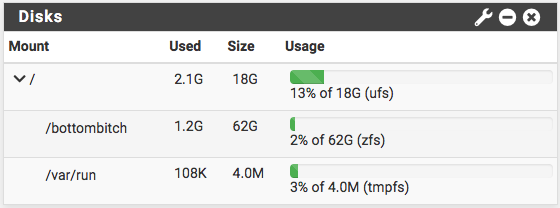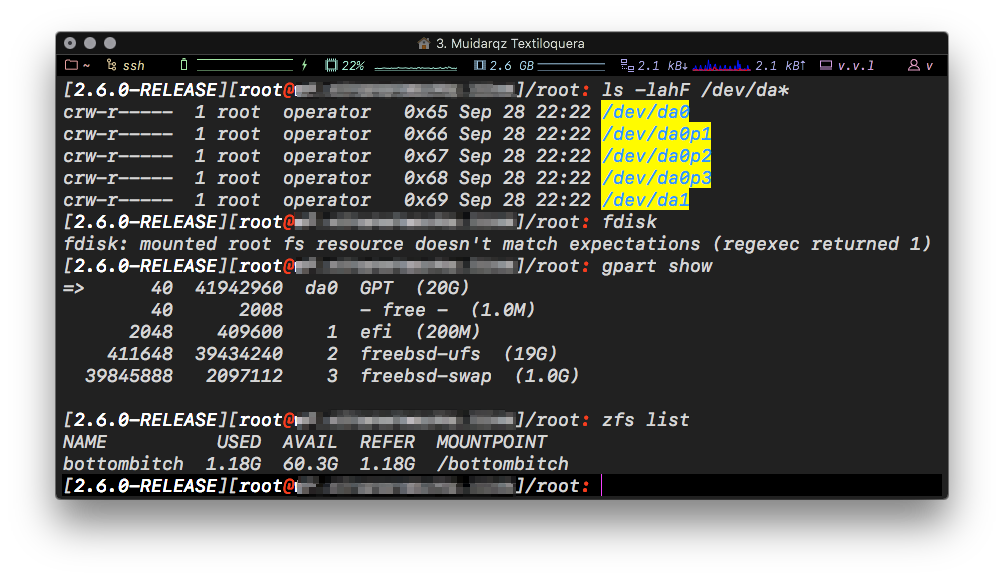Automount ZFS volumes/datasets
-
I have a forward/caching proxy system, like the main firewall it's got a tiny main disk and logs heavily but it rotates very quick so space isn't needed. Despite these systems being fresh installs, I went back to UFS because some odd issues on ZFS that disappear on the former.
The caching disk on the proxy is ZFS-formatted.

Standard locations for logs and Squid symlinked to this disk, it works great except that this time around I messed up something on my notes about this and it seems I omitted (and deleted mention of) the step to mount the disk on boot so I need to manually mount it or the symlinks revert to their literal location and it starts filling up real quick.
Any advise? :)(wait--not yet)
Thinking it might be easier to just reformat the disk as UFS to mount it via fstab just now I got a hint of a memory about it being mounted not with
zfs mount setNamebut something around the device's path; "/dev/da1" in this case, which won't appear listed ongpart, so I think I might be onto something. So far though, I haven't found in the FreeBSD's docs (specifically "The Handbook") about ZFS disk setup where the main disk isn't as well ZFS plus there's pfSense's own customizations to be considered after that.A bit more info:

Any advise? :)
-
@skilledinept have you looked at the zpool import command? That is typically how you make a system aware of a zpool and the datasets created on it
-
@skilledinept
I did some fooling around on 2.5.2 w. ZFS and a mount
https://forum.netgate.com/topic/165335/fun-with-zfs-snapshots-and-rollback/Bingo
-
Hey, thanks for answering,
@mer I had seen that but I figured it was for pools created on other systems, such as it would be in a reinstall.
Reading about it again I though, I rationalized, maybe pfSense just formatted some random disk then it went all "go find your mother, kid" on it, not actually claiming it. That made sense in my head somehow—not proud.
Then @bingo600 dials up the hope with a link, first thing I read, third line in a huge dark box
use '-f' to import anyway. "This is it." I rebooted the system to revert to normal conditions (not mounted automatically) and then raced against time, main disk is filling up.[2.6.0-RELEASE][root@xxx]/root: df Filesystem 1K-blocks Used Avail Capacity Mounted on /dev/gptid/a5747caa-51b3-11ec-9d4f-005056be0002 19093052 2231788 15333820 13% / devfs 1 1 0 100% /dev tmpfs 4096 60 4036 1% /var/run [2.6.0-RELEASE][root@xxx]/root: zpool-import -D zpool-import: Command not found.I was/am being guided by a temporary TrueNAS server because pfSense has no man pages. (Why?!)
[2.6.0-RELEASE][root@xxx]/root: zpool import -D [2.6.0-RELEASE][root@xxx]/root: zpool import -a [2.6.0-RELEASE][root@xxx]/root: zpool import -a /bottombitch too many arguments usage: import [-d dir] [-D] import [-o mntopts] [-o property=value] ... [-d dir | -c cachefile] [-D] [-f] [-m] [-N] [-R root] [-F [-n]] -a import [-o mntopts] [-o property=value] ... [-d dir | -c cachefile] [-D] [-f] [-m] [-N] [-R root] [-F [-n]] [-t] [--rewind-to-checkpoint] <pool | id> [newpool] [2.6.0-RELEASE][root@xxx]/root: zpool import bottombitchThe name of the pool, by the way, is how we say "caching disk" in my native language. It's pronounced with guttural sounds, hissing noises and a sigh. Any resemblance — if any, I don't know! — to English words is just a coincidence. You believe that, right?
cannot import 'bottombitch': a pool with that name is already created/imported, and no additional pools with that name were found [2.6.0-RELEASE][root@xxx]/root: mount /dev/gptid/a5747caa-51b3-11ec-9d4f-005056be0002 on / (ufs, local, noatime, journaled soft-updates) devfs on /dev (devfs, local) tmpfs on /var/run (tmpfs, local) devfs on /var/dhcpd/dev (devfs, local) [2.6.0-RELEASE][root@xxx]/root: zfs list NAME USED AVAIL REFER MOUNTPOINT bottombitch 1.04G 60.5G 1.04G /bottombitch [2.6.0-RELEASE][root@xxx]/root: zpool import -d /bottombitch [2.6.0-RELEASE][root@xxx]/root: mount /dev/gptid/a5747caa-51b3-11ec-9d4f-005056be0002 on / (ufs, local, noatime, journaled soft-updates) devfs on /dev (devfs, local) tmpfs on /var/run (tmpfs, local) devfs on /var/dhcpd/dev (devfs, local) [2.6.0-RELEASE][root@xxx]/root: zpool import -d /dev/da1 cannot open '/dev/da1/': Not a directoryAbout to quit the
zpool-importmanpage back on TrueNAS, just when I pressed the last key I caught a glimpse of the related commands at the end, one of them was:[2.6.0-RELEASE][root@xxx]/root: zpool export bottombitch [2.6.0-RELEASE][root@xxx]/root: zpool import bottombitch [2.6.0-RELEASE][root@xxx]/root: mount /dev/gptid/a5747caa-51b3-11ec-9d4f-005056be0002 on / (ufs, local, noatime, journaled soft-updates) devfs on /dev (devfs, local) tmpfs on /var/run (tmpfs, local) devfs on /var/dhcpd/dev (devfs, local) bottombitch on /bottombitch (zfs, local, nfsv4acls)It imported the volume and mounted it automatically, but on reboot it was unmounted again.
[2.6.0-RELEASE][root@xxx]/root: reboot Connection to 10.4.0.2 closed by remote host. Connection to 10.4.0.2 closed. zx9:~ v$ ssh wf df Filesystem 1K-blocks Used Avail Capacity Mounted on /dev/gptid/a5747caa-51b3-11ec-9d4f-005056be0002 19093052 2230600 15335008 13% / devfs 1 1 0 100% /dev tmpfs 4096 112 3984 3% /var/run devfs 1 1 0 100% /var/dhcpd/dev zx9:~ v$Logged in…
[2.6.0-RELEASE][root@xxx]/root: mount /dev/gptid/a5747caa-51b3-11ec-9d4f-005056be0002 on / (ufs, local, noatime, journaled soft-updates) devfs on /dev (devfs, local) tmpfs on /var/run (tmpfs, local) devfs on /var/dhcpd/dev (devfs, local) [2.6.0-RELEASE][root@xxx]/root: zpool list NAME SIZE ALLOC FREE CKPOINT EXPANDSZ FRAG CAP DEDUP HEALTH ALTROOT bottombitch 63.5G 1.04G 62.5G - - 0% 1% 1.00x ONLINE - [2.6.0-RELEASE][root@xxx]/root: zfs list NAME USED AVAIL REFER MOUNTPOINT bottombitch 1.04G 60.5G 1.04G /bottombitchIt's there but unmounted. I tried it again rebooting from the menu, maybe exiting the shell was required to save changes. Just casual aggressively uninformed speculation.
[2.6.0-RELEASE][root@xxx]/root: zpool export bottombitch && zpool import bottombitch && exit exit pfSense - Netgate Device ID: xxxxxxxxxxxxxxxxxxxx *** Welcome to pfSense 2.6.0-RELEASE (amd64) on wf *** WAN (wan) -> vmx0 -> v4/DHCP4: 10.4.0.2/24 v6: 2001:470:xxxx:xxx::2/64 0) Logout (SSH only) 9) pfTop 1) Assign Interfaces 10) Filter Logs 2) Set interface(s) IP address 11) Restart webConfigurator 3) Reset webConfigurator password 12) PHP shell + pfSense tools 4) Reset to factory defaults 13) Update from console 5) Reboot system 14) Disable Secure Shell (sshd) 6) Halt system 15) Restore recent configuration 7) Ping host 16) Restart PHP-FPM 8) Shell Enter an option: 5 pfSense will reboot. This may take a few minutes, depending on your hardware. Do you want to proceed? Y/y: Reboot normally R/r: Reroot (Stop processes, remount disks, re-run startup sequence) S: Reboot into Single User Mode (requires console access!) Enter an option: y pfSense is rebooting now. Stopping package squid3...done. Stopping /usr/local/etc/rc.d/haproxy.sh...done. Stopping /usr/local/etc/rc.d/lighttpd_ls.sh...done. Stopping /usr/local/etc/rc.d/sqp_monitor.sh...done. Connection to 10.4.0.2 closed by remote host. Connection to 10.4.0.2 closed. zx9:~ v$No…
[2.6.0-RELEASE][root@xxx]/root: mount /dev/gptid/a5747caa-51b3-11ec-9d4f-005056be0002 on / (ufs, local, noatime, journaled soft-updates) devfs on /dev (devfs, local) tmpfs on /var/run (tmpfs, local) devfs on /var/dhcpd/dev (devfs, local)But here comes more speculation
 a little more thought out this time,
a little more thought out this time,Since the system isn't booting the main disk as ZFS, could it be that it's not loading some service that mounts the ZFS pools? Or maybe the pool doesn't have a property, like "compression" for instace, that's required to automount it on boot? Not that I would know how to fix it, I think, but it's something to get guided by. :)
Thanks again to both for responding.
-
@skilledinept said in Automount ZFS volumes/datasets:
could it be that it's not loading some service that mounts the ZFS pools?
That is a good possibility. On a normal FreeBSD system /etc/rc.conf has "zfs_enable=YES" to enable/start the zfs service.
I don't have a pfSense with ZFS in front of me, but in the Web GUI, look under services and see if there is a ZFS somewhere to enable.